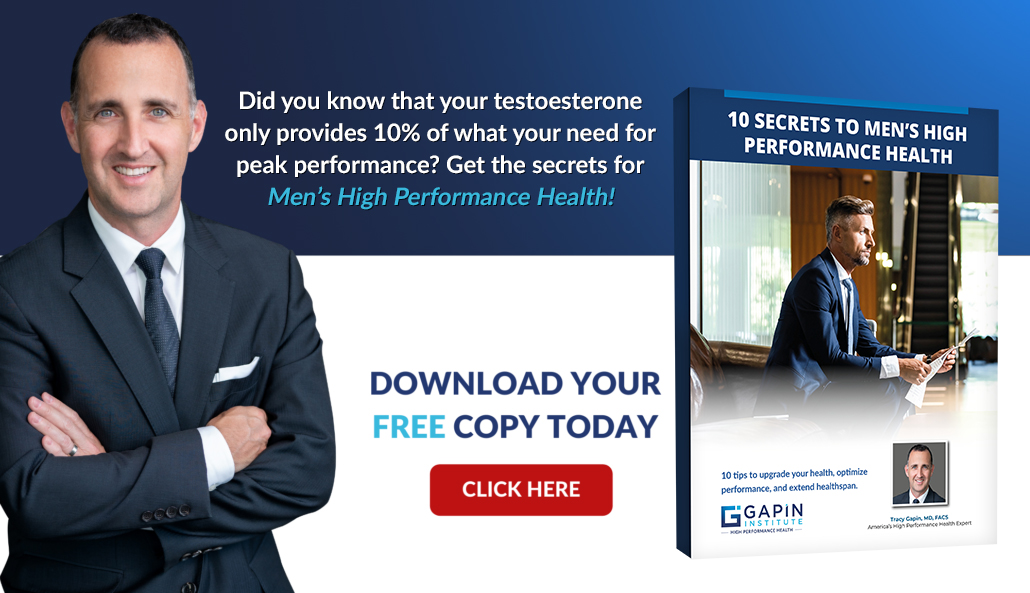
Everyone deals with stress. But the way you respond to that stress can either grow you or kill you. That’s not an exaggeration. Your “stress resiliency”—how well you cope with short- and long-term stress—is actually a consistent predictor for health, wellness, and mortality.
Research has shown that the response to stress has a greater impact on health and longevity than the stressor itself.
Let’s take a look at why stress is unhealthy, what stress resiliency is, and how you can enhance your stress resiliency to effectively handle stressors to maintain your health now and for many, many vital years to come.
Health problems of stress
Stress takes a toll on your health. There’s no question about it. You’ve likely felt the physical effects of stress before.
You’re dealing with a stressful project at work, but that stress doesn’t stay at work. You start to get anxious, and your mind is racing a million miles a minute. Your heartbeat is faster and your blood pressure is higher. You wake up in the morning exhausted and you’re tired all day, but you still have trouble sleeping at night. Your stomach hurts, your muscles are weak, and your brain is foggy. And that motivation to finish that project has flown out the window.
We often think of stress as a mental thing associated with anxiety and depression. It is, in part, mental. But it’s also entirely physical as well. Stress shows up in your body in a lot of serious physical manifestations. Trying different treatment plans could be the way forward to help you get this stress under control.
When faced with a stressor, your sympathetic nervous system activates and releases stress hormones like cortisol and adrenaline. This sets off the “fight or flight” response, used as a survival technique against the stressor. Physical signs of this response include:
- Rapid heart beat and breathing
- Increased blood pressure
- Pale or flushed skin
- Dilated pupils
- Enlarged blood vessels
- Digestion stops (blood rushes to muscles, away from stomach)
The fight or flight response can be incredibly useful when the stressor is an immediate threat to life, like if you run into a bear in the woods or your child is choking. Your body senses the stress and physically prepares to run or act. Your body actually has this response to help you react; for example, your pupils dilate so you can see more of the environment to respond to any incoming bear attacks.
But the fight or flight response was meant to be acute (short-term). It’s not supposed to last for more than 60 minutes. These hormones put your body into overdrive, literally changing how your breathing, blood, and organs function. After the stressor is gone, the parasympathetic system takes over to pull down the response and bring your body back to homeostasis.

The modern-day man is facing a unique biological challenge, though. Most of our stressors aren’t acute or life threatening. Oftentimes, in fact, our greatest stressors are fabricated in our heads. We’re stressed about being embarrassed or rejected. We’re stressed about things that are over and done with or things that haven’t happened (and may not happen).
We stress in a long-term, less tangible way. Stress is no longer: see bear, run or fight bear. Now, stress is: I have to do a presentation, but I don’t have all the information I need because Joe didn’t get it to me, and what if I pick the wrong slides, or what if I sweat through my shirt, and what if they don’t like me or I fail, and what if we lose the entire account because my ideas are no good, oh and by the way, I’ll have to run to my son’s soccer game but I forgot to pack his team snack, and my wife and I aren’t on the same page about saving our finances, and dang, I really want to go on vacation.
Did that inner monologue sound familiar? Maybe you even got stressed out reading it.
We all have stressful thoughts. But spiraling into a “stress monologue” can actually alert your sympathetic nervous system and put you into a perpetual fight or flight response. So, you put your mind and body into overdrive long-term, which is can cause serious health concerns.
Short-term impacts of stress include:
- Headache
- Fatigue
- Anxiety
- Sadness or depression
- Restlessness
- Lack of motivation or focus
- Muscle tension
- Irritability or anger
- Appetite changes (overeating or under-eating)
Long-term health impacts of stress are linked to:
- Diabetes (type 2)
- Cardiovascular disease
- Suppressed immune system
- Lower metabolism (weight gain)
- Low testosterone
- Alzheimer’s disease
- High blood pressure (hypertension)
- Infertility
There’s no doubt that stress is a serious health problem. Stress can even alter the expression of your genes, putting you at risk for disease and illness.
But it’s not actually the stressor that’s causing your health problems. Stress is completely internal. We can either let stress seep in and impact our health… or we can choose not to. If we don’t spiral into that stress monologue, our bodies won’t have that physical response.
Introducing “stress resiliency.”
What is stress resiliency?
Stress resiliency refers to how well you can respond to and cope with stress. It says whether you freak out or laugh it off. It determines how long you feel stressed, what you think about the stress, and how you handle people and situations around you.
Stress resiliency is the top predictor for mortality. Basically, if you stress more, your risk of dying early increases drastically. If you acknowledge stress and let it go, you’re more likely to live a healthier, longer life.
“Stress resiliency” has four main factors:
- The stressful event
- The external coping resources available to us
- The inner coping resources we’ve learned
- How we mentally mold the stress
(Psst… The final two factors are the greatest predictors for mortality and longevity. You’ll see why.)
- Stress event: Some stressors are more “stressful” than others. For example, the loss of a spouse is probably more stressful than running late for a work meeting. In general, long-term, “heavier” stress generally puts the individual at a higher risk for health complications.
Regardless, no matter the type of stress, the impact on health comes down to your personal coping mechanisms to respond to that stressor. If you easily get stressed every day, you’ll have worse health than someone who can grieve or stress in an effective way.
- External coping resources: Research shows that having strong social support can enhance stress resiliency. In opposition, poor social support can actually worsen your response to stress. In fact, a lack of social support may even modify the epigenetic expression of your genes! The feeling of loneliness can actually enhance stress and worsen the ability to respond to everyday stressors, often leading to psychiatric disorders like depression, anxiety, sleep problems, and Alzheimer’s disease.
- Internal coping resources: However, stress resiliency is not really about what others can do for you. Studies show that how you internally manage your stress is more important. Typically, these internal resources are learned mechanisms that you’ve gathered throughout your life.
For example, Joe sees his parents handle financial stress by fighting about it. Alex sees his parents handle stress by going on vacation for the weekend (leaving Alex with the grandparents). Joe is taught that arguing is the only way to cope with stress, but Alex sees a weekend away as the solution. They’ll likely take these coping mechanisms into their adult years as well.
But it’s not all about your childhood and parents, either. Throughout your life, you’ve handled stress in different ways. Some ways have worked for you. Others haven’t. The coping mechanisms you’ve been “rewarded for” start to get engrained in your brain.
A lot of us don’t have strong internal coping resources. That’s where a major part of the problem comes in. We’ve been (accidentally) taught that we should respond to stress with anger, frustration, sadness, or other negative emotions. We’re taught that stress is evil, so we have to respond by curling into a ball to protect ourselves from it.
That’s where the fourth factor comes in. Changing the way we view stress can improve and enhance our internal coping mechanisms.
- Mental molding: This is my favorite part about stress resiliency. The way you view stress is actually the most important factor in how you’ll respond.

Everyone experiences stress. But the people who embrace it, rather than ignore it or let it overcome them, actually see the greatest response. Individuals who see stress as a challenge, not a threat, are actually more productive and motivated.
Here’s the proof that this matters:
- A study at the University of Wisconsin-Madison found that people who believed stress had a negative impact on their health had a 43% increased risk of death. Those who experienced stress but didn’t see the effects as negative were least likely to die compared to others in the study.
- A study published in the European Heart Journal found an increased risk of cardiovascular disease in participants who perceived stress as negative. Repeated results in another study.
- A two-part study looked at adults’ “affect reactivity” to stress (how they respond to stress). The results showed that negative affective reactivity—an inability to respond positively to stress—had a significant association with mortality risk, more so than even experiencing the stress itself.
Where does this link come from?
Researchers aren’t exactly sure yet why a negative response to stress increases mortality risk while a positive response to stress may actually decrease it.
The two theories to answer this question involve sleep and energy movement.
First, people who don’t know how to handle their stress generally have a worsened quality and quantity of sleep. The brain is consciously and subconsciously worrying and stressing, which interrupts the calmness that’s required for sleep. When sleep goes awry, so does everything else. Your body uses sleep to reset everything including the immune, endocrine, and nervous systems.
But people who know how to handle stress are more likely to have effective coping mechanisms. They might meditate or workout or indulge in fun hobbies to release some of the stress. These healthy stress relievers can improve calmness, regulate hormones, and encourage quality sleep—all of which contribute to improved health and wellbeing. Certain coping mechanisms, like working out, actually make you healthier too!
The second theory is the way energy is translated. Stress creates a buildup of energy in your body. That agitated, restless feeling you get when stressed because your hormones are surging and your blood is racing. This physical response of energy can actually be productive if channeled effectively.
If you think this energy is negative, it will have nowhere to go—so it’ll start to eat away at your health. But if you see this energy is positive, you can actually use it to be more productive, creative, and action-oriented. You can utilize that energy for work or exercise, for example, to actually enhance your results.
Basically, stress can be incredibly useful and can even improve your health—when you think it’s useful.
How to enhance stress resiliency
Let’s go backwards through the four factors of stress resiliency to deepen and develop your response to stress from the inside out.
1. Train your brain.
Stress resiliency is about embracing and managing stress, not about avoiding or reducing it. So step one is training your brain to view stress as healthy.
Every time you have a stress response, it leaves an imprint on your brain so you can handle that stress in the future. This is called “stress inoculation,” where you get a mental vaccine to that stressor. Your brain actually grows and changes from the experience.
That’s why astronauts, athletes, emergency responders, and Navy SEALs all have to go through rigorous stress training. They’re put through physical and mental stress, because it hardens them to other stressors they might see in the field.
It’s time to recognize that stress isn’t against you. It’s there to help you grow. So when you start to feel that anxious, stressed out feeling, take control of your thinking. Follow this mindset process:
- Where is the stress coming from? What is the stressor?
- Why are you feeling so stressed out? Are you anxious about the past or future?
- Where is the stress in your body? Do you feel it in your head, your heart, your stomach? (This brings you into the physical sensation of the stress.)
- What can you do right now to calm those nerves? Think about your coping mechanisms.
- Consider what you could learn from this stressor. Why is this challenge put in front of you, and how can you grow from it?
Remember- the only people without stress are under ground!
2. Develop healthy stress management habits.
Now that you’re training your brain to see stress as positive, it’s time to update your internal coping mechanisms. It’s important to develop healthy reactions to stress, so you can have easy go-to methods to calm your brain and body when amidst the chaos.
For example, you may have built up resiliency to the daily stress of your job, but you don’t know how to mentally handle the death of your beloved pet. You want to stress management tools in your belt that you can utilize when new, unexpected stressors arise.
Remember that stress is still physical. So even if you’ve got the mental side down to a science by embracing stress, you’ll still want an arsenal of healthy internal coping mechanisms that can help regulate your stress hormones.
The best internal coping resource is actually laughter. Social studies show that people who can “laugh off” tension generally have a higher resiliency to stress. This isn’t always easy to do, and it often requires a major mindset shift. When you run into a traffic jam, look for the silver lining (like you’ll miss the first five minutes of that super boring meeting). When you and your partner are in a fight, drop the anger and get a little playful. Focusing on fun can help you redirect how your brain naturally responds to stress.
By the way, throwing a smile on your face actually makes you happier. Even if you’re not feeling amazing, smiling signals your brain to release “feel good” chemicals, so you’ll actually start to feel better!
Other ways to manage stress include:
- Deep breathing
- Meditation (learn about the neuroscience of meditation here)
- Exercise
- Fun hobbies
- Sex
If you are struggling to figure out your internal coping mechanisms, consider talking to a professional. Therapists are trained to figure out what makes you tick, so you can find stress management tools that will work for you.
3. Get social support.
You want to surround yourself with people who care about you, support you, and love you. Interestingly, though, “social support” isn’t actually what it might sound like. You shouldn’t surround yourself with people who are just there to make you feel better or let you wallow in your stress. You want “support” in that they push you and challenge you. Your social support should give you tough love and encourage you to channel your stress into something positive.
There’s another type of social support that works well: giving social support. One study looked at the link between stressful events and assisting others. They found that going through a major stress event increased a participant’s risk of death by 30%. But there was no increase risk of death in participants who frequently helped others or gave to their community—even if they dealt with high levels of stress. The researchers concluded that helping others could actually reduce stress and mortality rates.
The goal here is to get out of your own mind and into the beauty of relationships. You want to surround yourself with people who will comfort and challenge you, while being grateful for the people you have in your life. You also want to channel your stress to become a beacon of light for others. Giving is the best way to receive.
4. Know your stressors.
The first factor of stress resiliency is just the stressor itself. Different people have different stressors that elicit different reactions. For example, you might get really stressed by traffic but not by being late. Or you might be constantly stressed about your kid or your boss or your weight, but your wife is always stressed about money.
It’s important to acknowledge what makes you stressed, so you can learn to embrace these moments. It’s not about avoiding traffic or quitting your job. You just want to understand where your stress comes from, so you can start to focus your energy on how to better embrace those areas of your life. You can then direct your internal coping mechanisms effectively.
5. Focus on your health.
There’s a fifth method to consider… your health! Stress can worsen your health—but poor health can also stress out your body. If your hormones are out of whack, it’s easier to let stress seep in.
For example, low testosterone can actually worsen stress. The symptoms of low testosterone include fatigue, insomnia, irritability, anxiety, depression, weight gain, and a loss of muscle mass. These symptoms can all make your mind and body more stressed, which can send you into a “stress spiral.”
For example, if you’re not sleeping, your body doesn’t have time to produce testosterone and clear our cortisol—so you end up with an even worse imbalance of low T and high cortisol. The higher your cortisol, the more you’ll feel those physical effects of stress. Check out these 5 easy ways to balance your hormones.
Pregnenolone is the “building block” hormone. It’s the hormone used to create all other hormones—including both testosterone and cortisol. When the pregnenolone isn’t being used to create testosterone, there’s more available to create cortisol. So keeping your testosterone high is also a great way to keep your cortisol to a minimum. Oh, and by the way, some research shows that strong testosterone levels are linked to longer lifespans. Get more info about testosterone here.
You are resilient
Stress resilience is a direct predictor of mortality. How you respond to stressful situations has a greater impact on your health and mortality than even exposure to stress on its own. A negative view of stress can lead to a number of health problems in both the short- and long-term, eventually leading to early death. But seeing stress as an exciting challenge to overcome may actually improve your mental and physical health.
So how do YOU see stress?
Is your stress going to make you or break you? Are you going to grow or perish?
Are YOU ready to transform your health?
With our high performance health program, I use testing and analysis to look at your genetic makeup and epigenetic expression to understand exactly how your body is working today. Together, we then create a personalized lifestyle plan, one variable at a time, to bring your body into its peak state.
Want more tips to optimize your health and testosterone?
Listen to the latest podcasts. Click HERE
Tracy Gapin, MD, FACS – Board Certified Urologist in Sarasota, High Performance Health Expert and Founder of www.GapinInstitute.com






 Not all exercise is created equal when it comes to raising testosterone levels.
Not all exercise is created equal when it comes to raising testosterone levels.  Compound exercises work a number of muscle groups at one time. Research shows that testosterone levels are correlated with the amount of muscle tissue that’s stimulated during a workout. The more muscles you work, the greater the T boost. You want to avoid isolation exercises, which have no proven impact on testosterone.
Compound exercises work a number of muscle groups at one time. Research shows that testosterone levels are correlated with the amount of muscle tissue that’s stimulated during a workout. The more muscles you work, the greater the T boost. You want to avoid isolation exercises, which have no proven impact on testosterone. 










 In Male 2.0™, Dr. Tracy Gapin has turned everything we once thought we knew about men’s health and performance upside down. The old model of how to be “a man” is broken. A man who works himself to death. A man who tries to NOT get sick but isn’t really healthy either. A man who takes a pill for every ill but is never really cured. That was Male 1.0. Now, imagine being THE MAN ─ owning your performance in the bedroom, the weight room, and the boardroom. Living a fully optimized life. Becoming limitless. This is Male 2.0!
In Male 2.0™, Dr. Tracy Gapin has turned everything we once thought we knew about men’s health and performance upside down. The old model of how to be “a man” is broken. A man who works himself to death. A man who tries to NOT get sick but isn’t really healthy either. A man who takes a pill for every ill but is never really cured. That was Male 1.0. Now, imagine being THE MAN ─ owning your performance in the bedroom, the weight room, and the boardroom. Living a fully optimized life. Becoming limitless. This is Male 2.0!





